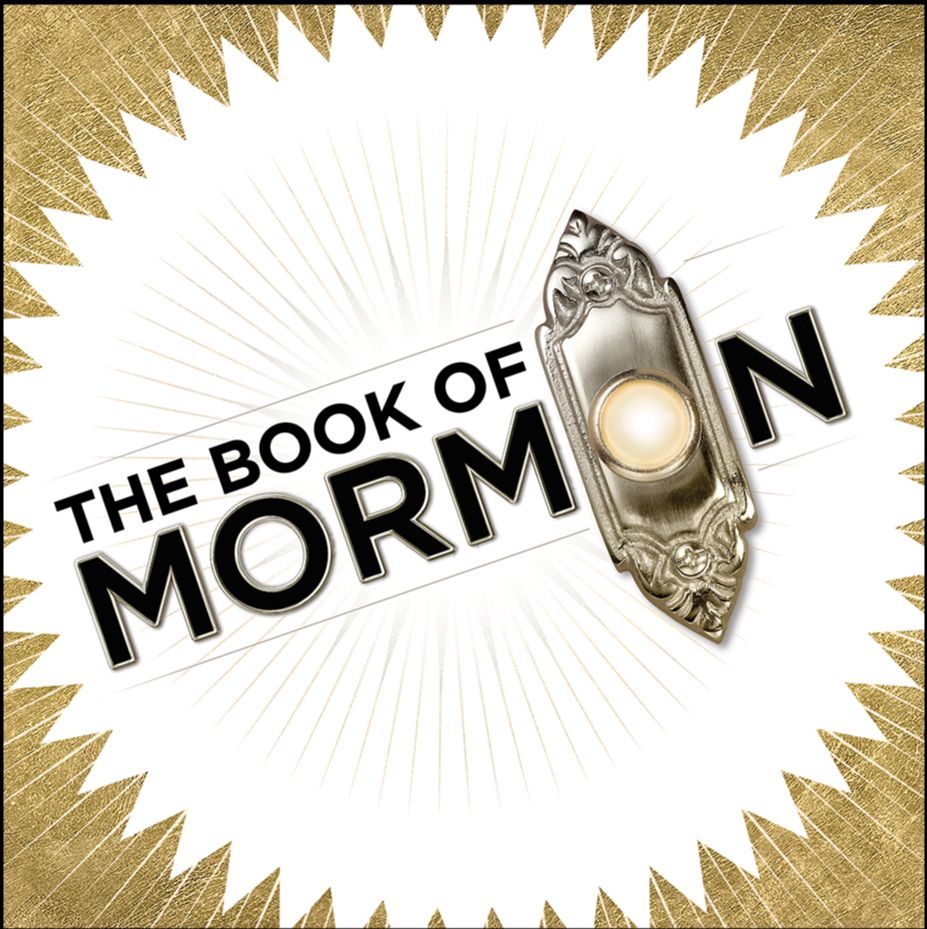
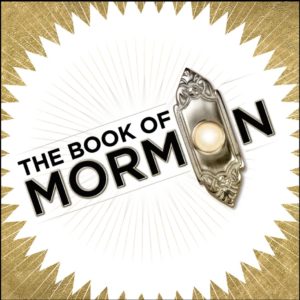 [rating=5]As of June 2022, “The Book of Mormon” has been the sixth highest grossing show of all time in its original Broadway run, only second to “Hamilton” in terms of how quickly it has achieved its dollar mark. So why is it so well liked? Why does this show remain so fresh, popular, and relevant for today’s audiences, regardless of when and where it is being performed? One reason is that the book (written by Trey Parker, Robert Lopez, and Matthew Stone) includes a tremendous amount of “politically incorrect” and irreverent comedy. Another reason is that music and lyrics are generally uplifting and meaningful. Then too, the clash of cultures in this musical is fun to watch! I also liked that the story explores human nature at large and the frailties that people share in common regardless of what part of the world that they come from; this includes their deeply-held questions about how they should lead their lives.
[rating=5]As of June 2022, “The Book of Mormon” has been the sixth highest grossing show of all time in its original Broadway run, only second to “Hamilton” in terms of how quickly it has achieved its dollar mark. So why is it so well liked? Why does this show remain so fresh, popular, and relevant for today’s audiences, regardless of when and where it is being performed? One reason is that the book (written by Trey Parker, Robert Lopez, and Matthew Stone) includes a tremendous amount of “politically incorrect” and irreverent comedy. Another reason is that music and lyrics are generally uplifting and meaningful. Then too, the clash of cultures in this musical is fun to watch! I also liked that the story explores human nature at large and the frailties that people share in common regardless of what part of the world that they come from; this includes their deeply-held questions about how they should lead their lives.
The plot focuses on the lives of two Mormon missionaries-in-training, Elder Kevin Price (Sam McLellan) and Elder Arnold Cunningham (Sam Nackman), who are assigned as a team to proselytize the native people in Uganda. Price and Cunningham are white men deeply committed to missionary work but are very different from each other in temperament and interests. Price is a devout sort who does everything by the book and doesn’t deviate from what he has been taught. He has a strong ego and aspires to hold a leadership position in the Church of Latter-Day Saints. Cunningham, in contrast, is less conventional. He is in love with science fiction and admits early on that he is prone to lying—because he has such a good imagination: “Is there anything wrong with that?” he says. He knows that he doesn’t fit the mold of the perfect missionary but wants to be a “really good follower.” Cunningham’s parents believe that his doing missionary work and going overseas might help him find his path in life.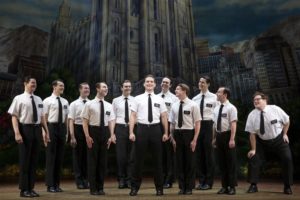
The audience follows the two men on their adventures in Africa, where are initially welcomed to their Ugandan village by tribal member Mafala Hatimbi (Lamont Joel Whitaker) and later his daughter Nabulungi (Berlande). We immediately see the economic and cultural clashes between these rather privileged American men (in their white shirts, black pants, and solid ties) and their prospective converts, who suffer from poverty, disease, and crime. Above all, they fear the military ruler of the village General XXX (Dewight Braxton, Jr.) and his henchmen (Kemari Bryant, Justin Phillips). We watch Price and Cunningham subsequently meet up with their fellow missionaries-in-training, led by Elder McKinley (Sean Casey Flanagan), who complain that this part of the world has yet to have any religious conversions to Mormonism. They are afraid that their mission president (Trevor Dorner) will be greatly disappointed by their complete lack of success.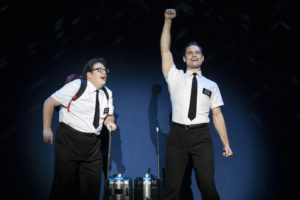
A stellar cast makes up this wonderful performance, and the singing voices of the characters are extraordinary, such as that of McLellan, Nackman, Flanagan, and Berlande. Other members of the cast include (but are not limited to) Vance Klassen, Gideon Chickos, Trinity Posey, and Kyle Segar. Choreography is superior, led by dance captain Joshua Keen and assistant dance captain Thomas Ed Purvis. Plus all of the actors in this production excel in their uses of body language: gross and nuanced. How perfect! The “Book of Mormon” orchestra is conducted by Mason Moss and assistant conductor Thomas Michaels, with musical supervisor and vocal arranger Stephen Oremus. Perhaps the most memorable number is the one called “Hello” at the very beginning. It is sung in a round and can boast of a tremendous use of counterpoint. The lyrics suggest a journey where we don’t know which door will open, whom we will meet, and what will happen next. Chad Parsley’s sound design is excellent, such that we are able to make out all of the words of all of the songs, even when they are sung during other action on stage. I especially liked the stained glass frame surrounding the stage, with the gold statue of Moroni on top, blowing his horn, reminiscent of the angel Gabriel.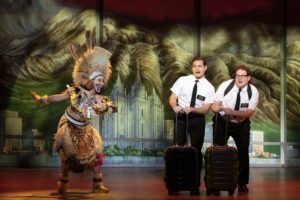
Most people will find this show uproariously funny and clever. The more offensive the curse words, the more we laugh, given the presumption of holiness and righteousness throughout. Considering all the swearing, explicit body language having to do with sex, and frank discussions of female circumcision, this presentation (needless to say) is not for the faint-of-heart. Yet the tight layering of sacred and profane elements is done in such a way that deflects us from becoming somewhat too morose in questioning the meaning of religion and why God could create a world where there is so much human suffering. Of course, this leads us to ask: Can this suffering ever be relieved by belief in any one religious faith or by adhering to a specific worldview? Then too the juxtaposition of aboriginal and modern American culture is humorous, because each society has a different type of understanding of how the other one works, and they have very different reference points with regard to their belief systems. I’m not ruining the ending for you by saying that everybody becomes copasetic—for what else would one expect in a happy musical? Among other things, we see the white men taking on aspects of the African people (as demonstrated by their wearing native clothing) while the African people take on aspects of the white men (as in wearing white Windsor ties).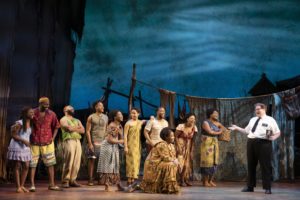
The musical can thus be analyzed at several different levels. In addition to the humor and the music, there is the faith-based element of the story, which assumes that most Americans, even if they are not religious, are familiar with many aspects of the Bible and its teachings. So which religious heroes should we model ourselves after, and which ones should we doubt regarding their faith or their sincerity? This leads to the main question underlying the show: What may have spurred Mormonism’s founder Joseph Smith to write a “third testament” of the Bible and establish a brand new religion during the mid-19th century? Is this religion (and, by default, others that currently exist or have preceded it) divinely inspired or not? Is it blasphemous to examine Smith’s motivation and that of Brigham Young—or is this a good and honest thing to do? All this being said, isn’t the musical “The Book of Mormon” truly an insult to Mormons or Scientologists or those from other religious minorities whose teachings we don’t really understand or don’t care to understand? What makes a newer religion any more or any less valid than one which has been established for centuries? In my opinion, if this show were based upon a more mainstream religious institution with a large number of followers and a set of deep-seated beliefs and rituals, the audience would not laugh as hard.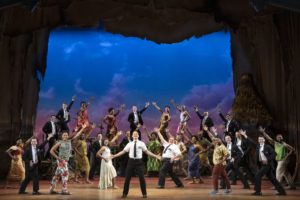
The Broadway in Chicago production of “The Book of Mormon” is playing through April 16, 2023, at the Cadillac Palace Theatre, 151 W Randolph Street, in Chicago.
Single tickets start at $51.50 plus applicable fees.
Performance Schedule:
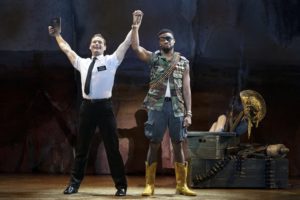 Tuesdays, Thursdays, and Fridays – 7:30 p.m.
Tuesdays, Thursdays, and Fridays – 7:30 p.m.
Saturdays – 2:00 and 8:00 p.m.
Sundays – 2:00 p.m. and 7:30 p.m. ( except on 4/16- no evening)
Additional performance: Sunday, April 2 – 7:30 p.m.
For more information about the show and to purchase tickets, go to: https://www.broadwayinchicago.com/show/the-book-of-mormon-2023/.
For information about ticketing options, see https://www.broadwayinchicago.com/tickets/.
The Cadillac Palace Theatre recommends that their audiences wear masks throughout the building.
Visit https://www.broadwayinchicago.com/covid19/ for further details.
Running Time: 2hrs, 30mins; one intermission
To see what others are saying, visit www.theatreinchicago.com, go to Review Round-Up and click at “The Book of Mormon”.



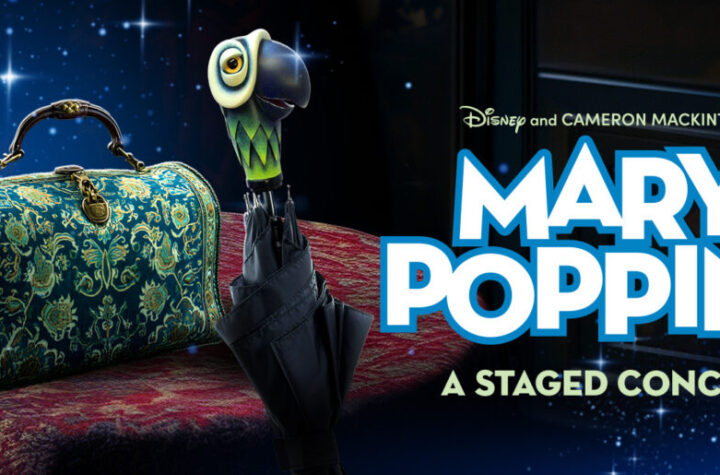
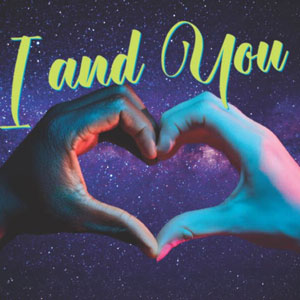
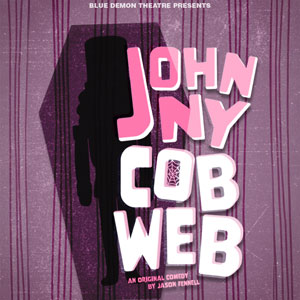
More Stories
“The Joffrey Ballet’s Golden Hour” reviewed by Carol Moore
“Mary Poppins : A Staged Concert” reviewed by Julia W. Rath
” I and You”